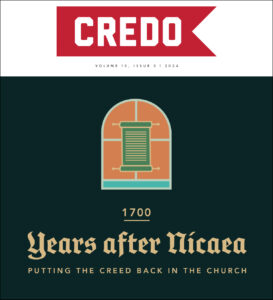John Gill was the pastor of Horsleydown Baptist Church, which would later become The New Park Street Chapel, famously the home of Charles Spurgeon’s ministry. His faithful ministry lasted from 1719 until his death in 1771, and was marked not only by the length of his tenure at Horslydown, but by faithful biblical, theological, and practical reflection in his writings. He wrote a commentary on the whole of the Scriptures, but is perhaps best known for his Body of Doctrinal and Practical Divinity, one of the earliest Baptist systematic theology texts. Gill’s preaching and writing ministry was marked by absolute devotion to knowing and loving the God of the Scriptures and the Gospel. For this reason, when Sabellianism, Socinianism, and other forms of Trinitarian heterodoxy and heresy came into vogue among the eighteenth-century Baptists, Gill wrote The Doctrine of the Trinity Stated and Vindicated.
Gill’s treatise is divided into nine chapters. The first three chapters are dedicated to proving, from Scripture, that God is one, that there is a plurality in the Godhead, and that the plurality of the Godhead is Trinitarian. The fourth chapter considers the deity and character of the Father. Chapters five through eight concern the Logos, the deity of the Word, the Sonship of Christ, and the personhood of the Son, respectively. The ninth chapter concludes the book concerning the deity and personality of the Holy Spirit.
Gill reminds every reader that to rightly proclaim the Gospel of Jesus Christ, we must rightly know the Triune God. Click To TweetGill demonstrates his ability as a biblical exegete throughout the first three chapters. He engages with the text of Scripture in Hebrew, Greek, and English translation. Through exegesis of the Scriptures, Gill demonstrates that one must utilize the totality of the Canon in clarifying doctrine, particularly the doctrine of God. Gill’s exegesis of the Hebrew text of the Old Testament brings with it an evangelistic concern for Jewish readers to read more attentively the Scriptures, and his Greek exegetical work demonstrates not only mastery of the text of the Scriptures but an ability to engage with the Greek fathers and their exegesis. Gill further expounds the use of the language of substance and subsistence regarding the full divinity of the Persons of the Trinity while maintaining the eternal relations of the Unbegotten Father, the Eternally Begotten Son, and the Eternally Filiated Spirit.
The next section of chapters addresses the personhood and divinity of each of the Persons of the Trinity. Again, Gill exercises his skill as one under the authority of the Scriptures, simultaneously building his argument in line with the Great Tradition. He utilizes a great breadth of the Church fathers and later Puritan authors, particularly John Owen, to explicate orthodox Christian teaching: each of the Persons is God, distinguished by eternal relations of origin, seen in the divine missions. Gill exhibits pastoral, evangelistic concern through his meticulous work dedicated to establishing beyond a doubt that the Son is a fully divine Person in the Triune Godhead. For Gill, along with the Christian tradition, to miss the eternal deity of the Son is to miss the Gospel, and to miss the Gospel is to lose eternal life with God. Gill’s final chapter follows a similar format to his previous argument, though in one chapter; he asserts that likewise to the Son, the Holy Spirit must be eternally a divine Person proceeding from the Father and the Son.
John Gill’s The Doctrine of the Trinity Stated and Vindicated is an essential read for pastors. This book exhorts the reader to truly know the God who makes Himself known through the Scriptures. This requires careful, precise exegesis of the Scriptures. But Gill does not stop there. He, as a pastor, employs a depth and breadth of knowledge from Jewish, Greek, and Christian thought, testing various views according to the Scriptures to explain what must be repudiated by Christians and what must be embraced. The culmination of Gill’s thought throughout this work is the doctrine of God and the Gospel. Gill reminds every reader that to rightly proclaim the Gospel of Jesus Christ, we must rightly know the Triune God.


